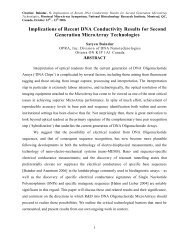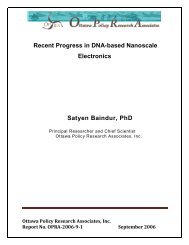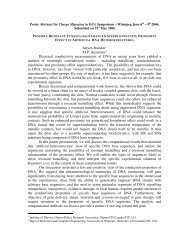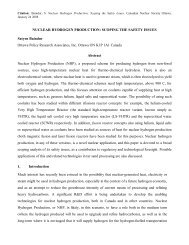Development Ethical and Societal Issues Satyen Baindur PhD
Ethical and Societal Issues - Satyen.Baindur.Org
Ethical and Societal Issues - Satyen.Baindur.Org
Create successful ePaper yourself
Turn your PDF publications into a flip-book with our unique Google optimized e-Paper software.
Stewardship in Nanotechnology <strong>Development</strong>:<br />
<strong>Ethical</strong> <strong>and</strong> <strong>Societal</strong> <strong>Issues</strong><br />
SATYEN BAINDUR, PHD<br />
Ottawa Policy Research Associates, Inc.<br />
OPRA Report 2006-4-1 Issued April 2006<br />
------------------------------------------------------------------------------------------------<br />
trains to automobiles <strong>and</strong> even toasters being atomic-powered. It was also projected to<br />
become so cheap that it would not need to be metered. Some of these possibilities were<br />
not realized because they proved technically infeasible. Others could not be<br />
commercialized because of a variety of reasons.<br />
There are some similarities in the projections made about nanotechnology today,<br />
in the pervasiveness that is held out for nanotechnology, <strong>and</strong> also in the oft-repeated<br />
assertion that the nanoscale is the most basic length scale at which all interesting<br />
phenomena occur, <strong>and</strong> that ‘biology, chemistry <strong>and</strong> physics’ all come together at this<br />
scale. It is further claimed by some that therefore, nanotechnologies will also<br />
revolutionize science education by properly emphasizing the importance of the<br />
nanoscale, doing away with traditional distinctions between scientific disciplines. While<br />
there may be a grain of truth in this, such assertions mostly just add to the hype<br />
surrounding nanotechnology today, since similar things were one said about atomic<br />
science, space science or computer science.<br />
That said, it is undoubtedly true that future development of nanotechnology will<br />
likely lead to a decline in employment in some sectors of the economy, that others might<br />
operate with different raw materials or use them less intensively, <strong>and</strong> some entirely new<br />
sectors will also evolve. This has happened with virtually all technologies. Seen in this<br />
light, nanotechnologies would be different from other technologies only in the details of<br />
which sectors <strong>and</strong> skills are impacted. This assertion is, however, somewhat weakened if<br />
it is realized that nanotechnology is explicitly conceived today as a transformative<br />
technology designed to change the basic dynamics of all economic sectors. By contrast,<br />
the Internet, when conceived, was designed merely as an emergency communication<br />
medium. That it has had a much broader impact today, simply underlines the fact that<br />
long-term techno-socio-economic projections have significant uncertainties. For this<br />
reason, even though the stated aim of nanotechnology is to impact all sectors, it may<br />
prove to be less than that – or it may prove to be far more than even its strongest<br />
supporters envision today.<br />
21<br />
21










